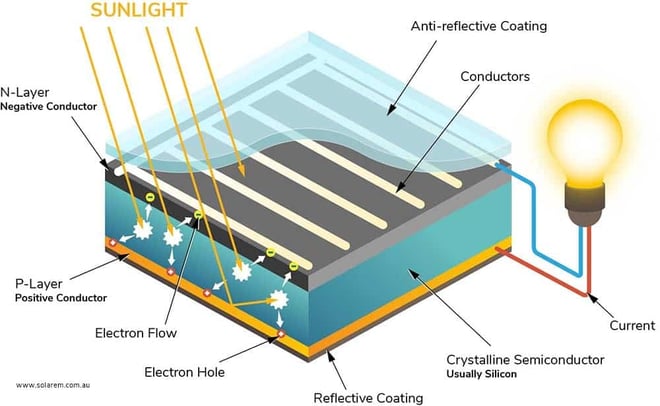Blog Updated: June 2024
Solar panel recycling has always been a major question in the solar industry. But, because solar panels last so long, it was largely a question that the industry put off for later. Later is now and we need to deal with it. Namaste Solar has been looking for local options, and now that some are available, we are finding a responsible way to recycle panels at the end of their lifespan.
The basics: What is a solar panel made of?
Solar panels are about 80% glass and aluminum plus some other components like copper, rubber and plastics. Underneath the glass are semi-conductors made from polycrystalline silicon. This silicon layer converts photons from sunlight into free electrons that then produce electricity. While the vast majority of materials in a solar panel are non-toxic and easy to recycle, there are trace amounts of toxic elements like lead that need to be removed during the recycling process.

Why do I need to know what’s in a solar panel?
When you understand what a panel is made up of you can see why it is important that panels are recycled properly once they reach the end of their ~30-year lifespan. If the toxic materials in panels are thrown into a landfill, eventually they can leak into the ground and the water. Elements like lead and silver can’t be broken down any further which means our environment will be exposed to toxic materials.
What has Namaste Solar learned so far?
Right now, Namaste Solar de-installs around 150 damaged solar panels per year. The International Renewable Energy Agency estimates that by 2050 the world will generate as much as 6 million tons of solar panel waste per year. We want to do our part to make sure solar panels are recycled properly and safely so we’ve been searching for the best options for a couple of years now. Here's what we know:
Our action steps:
We currently use Fabtech to recycle our decommissioned solar panels. They provide solar panel recycling and reuse solutions that are fast, easy and EPA compliant. They also have a zero-landfill policy. Headquartered in Arizona, Fabtech has multiple locations for solar panel recycling including locations in Colorado. It is important to us to work with a panel recycler that is intentional and transparent with their recycling process, so we’re excited to continue using this option of recycling damaged panels.
Your action steps:
Eco-Cycle, a Boulder-based non-profit recycler and zero waste organization, created CHaRM (Center for Hard to Recycle Materials) in 2002, the first community recycling center for electronic waste in Colorado. This is the option we would recommend to individuals trying to recycle their panels. You can drop off your panels with CHaRM and they will be taken to ERI to be recycled for a cost of $1.25 per pound.
Further, the Solar Energy Industries Association has a national PV recycling program. You can learn more here.
More information on recycling solar panels:
GreenMatch, a UK based company, designed a guide to help people navigate the transition to renewable energy. Their interactive infographics provide even more information about how solar panels are recycled and what the future of solar panel waste management looks like.
I have solar panels, what does this mean for me?
You probably don’t have to worry about this anytime soon since many solar panel systems last around 30 years. By then we bet there will be more developments with panel recycling and even more options for you to choose from. If you are a Namaste Solar customer and your solar panels are damaged in the meantime, we can work with you to de-install and replace them. We can also help you find the best solution for recycling your damaged panels, whether we take the panels for you, or you take them to Eco-Cycle yourself.
For now, we believe it is important to get the conversation started because proper solar panel waste management now can lead to a better future for solar and for the environment.

